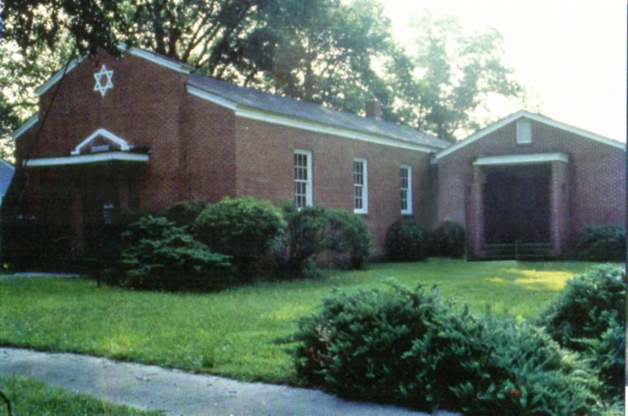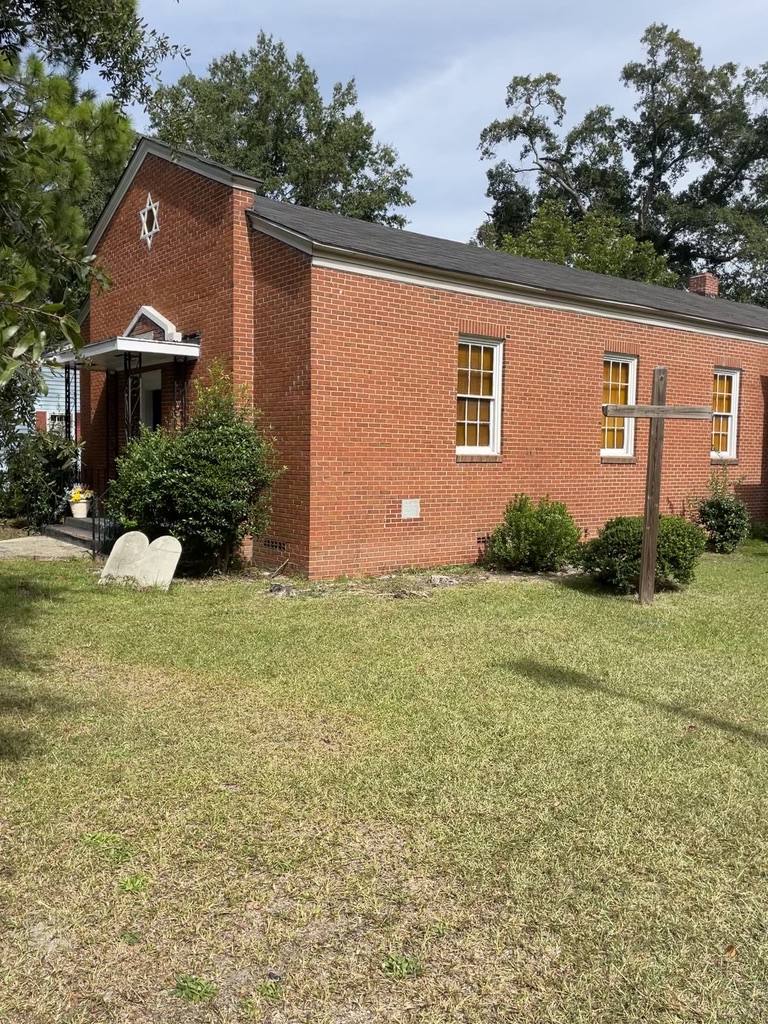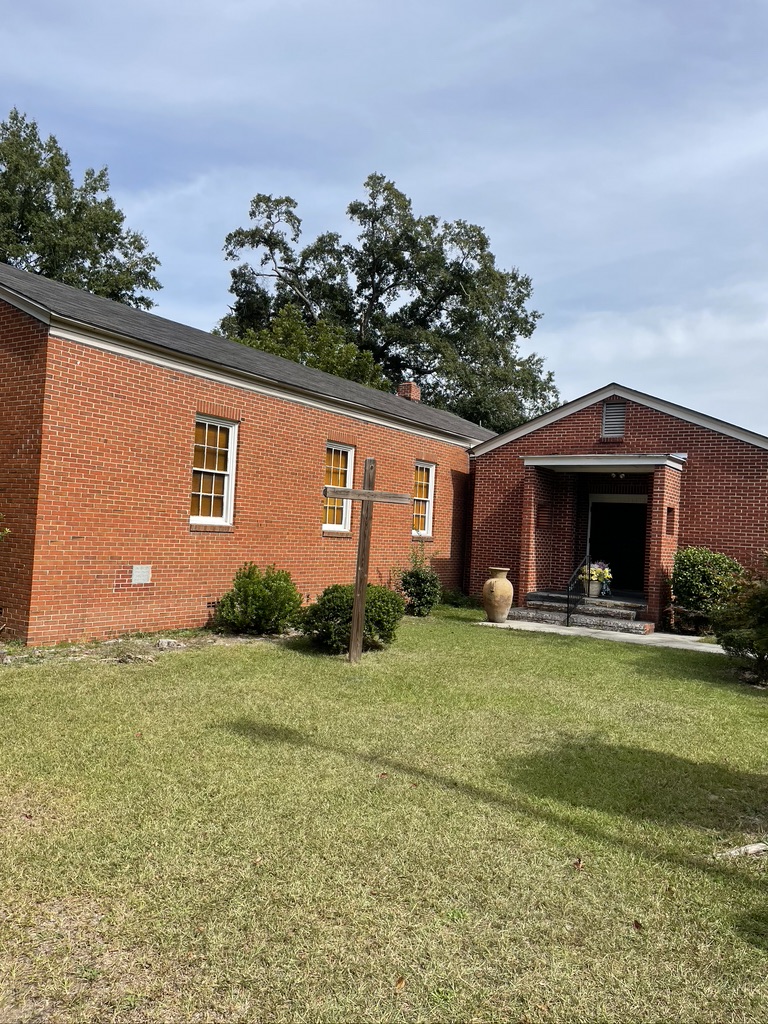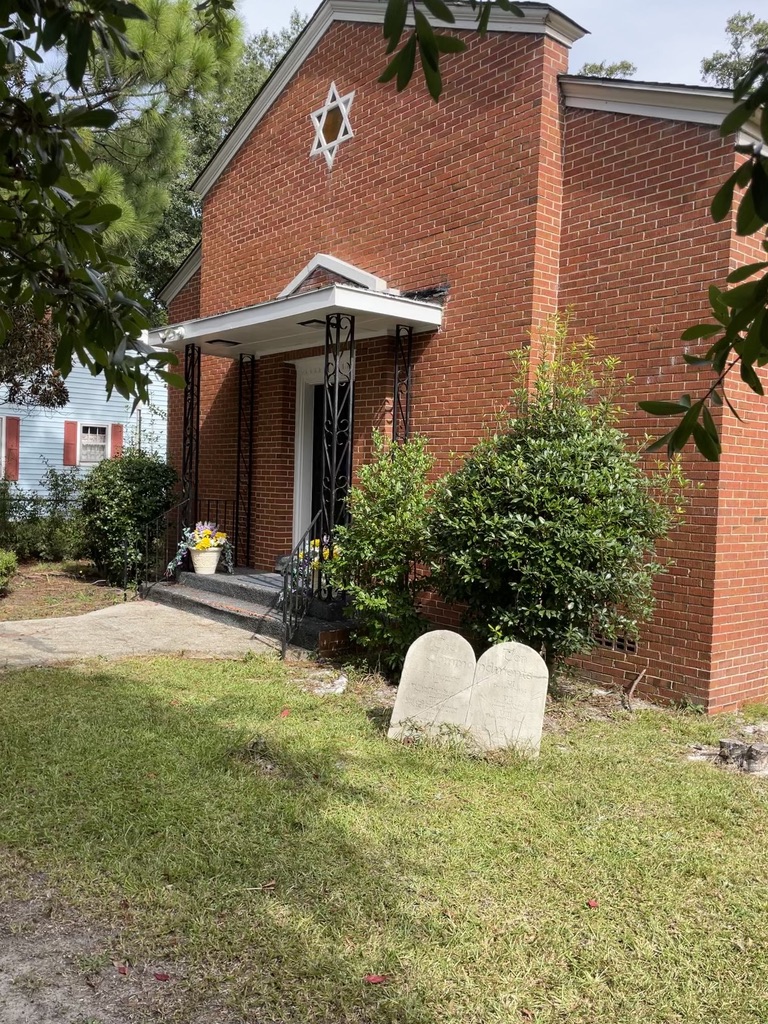
Ohav Shalom
211 South 12th Avenue
Dillon, SC 29536
Year Built: 1942
Architect: Unknown
Years Active: 1915-1993
Congregation History
Early Jewish Settlement
Dillon, South Carolina was officially established in 1888 when the Florence Railroad Company built a rail line that reached the town.1,2 A loading dock was built just south of the town.,, which would eventually become the town of Latta. Not long after, Jewish immigrants began moving to the region and formed the foundations of the Dillon/Latta Jewish community. Because of the community’s small size, they were often linked by family ties.3 One of the first known Jewish immigrants was Abraham Schafer, who immigrated from Germany in the 1870s and his wife Rebecca Iseman. Schafer and Iseman, were successful merchants in the dry goods business in Little Rock, SC, and they wanted to expand their operations to include two stores in Dillon and Latta.
Many late-nineteenth and early-twentieth century East European Jewish immigrants were of Orthodox backgrounds. They struggled to maintain religious traditions in rural communities like Dillon and, as such, began to adjust their religious practices. For example, they kept their stores open on Saturdays to accommodate the local farmers who traveled to town to do their shopping on the weekend. The local merchants did, however, close their shops on the High Holidays. To adhere to dietary laws as best as possible, some families purchased kosher meat from Baltimore, which was shipped by train.
Burgeoning Jewish Community
The Jews of Dillon enjoyed a good deal of commercial success and, as a result, many Jews became active in Dillon’s civic life.4 One notable figure was Morris Fass, a department store owner, who was a member of Dillon’s Chamber of Commerce and the Dillon Board of Trade.5 Additionally, he was also an alderman, Mason, and a charter member of the Dillon Rotary Club. Max Fass, Morris’ brother, was also a Mason and a Shriner.
In addition to their civic contributions to Dillon, Morris and Max Fass were instrumental in establishing the Dillon Hebrew Congregation, Dillon’s first Jewish organization, in 1915. Other members included Adolph Witcover, Hyman Witcover, William Brick, and Sam Levin. For many years prior, the Dillon Hebrew Congregation met primarily at the home of one the Fass brothers. In addition to being a founding member, Morris Fass served as the lay leader. On the High Holy Days, laymen from around South Carolina and the neighboring states were hired to conduct services.6
In 1920, the Congregation purchased a Torah scroll for $300, and they agreed amongst each other that “this Torah shall not be the property of any one member, but shall belong to all regardless of each individual’s contribution.”7 Many members of the congregation were merchants who traveled from neighboring small towns that lacked their own synagogue or congregation. Beginning in 1922, the Jewish community in Dillon hired Rabbi Jacob S. Raisin of Kahal Kadosh Beth Elohim in Charleston, SC to conduct services once a month. These services took place on Sunday, still occurring on Sundays to accommodate Rabbi Raisin’s responsibilities at KKBE and because the shop owners needed to be open for the surrounding Christian community. Around this same time, Fannie Brick, wife of William Brick, organized the first Sunday school. These classes were held at Max and Teresa Fass’ home.8
Teresa Fass passed away at the young age of 47 in 1927 and both the Congregation and Sunday school were renamed as the Teresa Witcover Fass Congregation in her honor. Twenty-one female congregation members also established the Teresa Witcover Fass Sisterhood, which supported the religious school, hosted holiday celebrations, participated in charitable work, and raised money to build the synagogue.9
Jewish Life During the Great Depression
The congregation struggled during the Great Depression, especially following the deaths of Max and Morris Fass in 1935. Despite this, the Jewish population of both Dillon and Latta reached their height in 1937 with 84 Jews in Dillon and 75 Jews in Latta. Even though there were several Jewish families, the Dillon Hebrew Congregation went inactive between 1935 and 1939.10 In 1939, the congregation hired Rabbi Samuel R. Shillman from Temple Sinai in Sumter to lead services periodically. Shortly after, the Congregation reorganized and officially incorporated under the name Ohav Shalom, or “Lovers of Peace.” During this time, the Congregation shifted from Reform to Conservative Judaism, though the distinction was not always clear out of necessity due to the hiring rabbis from different denominations .11
Soon after reorganizing, land was purchased and the building of a synagogue began in 1942, finishing that same year. Rabbi Shillman left Ohav Shalom in 1948 and a number of rabbis from different denominations were hired over the years and decades. One rabbi, Rabbi Murray Alstett of Fayetteville, is said to have, “served this congregation long and faithfully.”12
Revitalization of Jewish Life
The 1950s were a very busy decade for Ohav Shalom. In November 1954, Friday evening services were routinely offered and a community center was built in 1956, in which Sisterhood meetings and religious school classes were held. Prior to completion of the community center, these meetings and classes were held in the synagogue. The Temple Sisterhood established funds for library books, began hosting interfaith community events, and even joined the National Women’s League.13
Due to the small size of the community, the congregation had not prioritized the purchase of a burial ground, particularly because of the close proximity of the Jewish cemetery in Florence, which was 30 miles away. Despite this, a small portion of land was purchased in the early 1960s to serve the Jewish community and the first burial took place in 1967.14 As of 2003, there were 25 recorded burial plots.
In 1962, the congregation added a third building to Ohav Shalom for educational purposes. A survey of the congregation reveals that there were 25 families in regular attendance in 1964. Between 1939 and 1964, the congregation hosted sixteen confirmations and eight bar mitzvahs. Ohav Shalom continued to maintain membership numbers throughout the 1970s and into the early 1980s. Membership started to decline in the late 1980s and early 1990s, as a result of families moving out of the area, deaths, intermarriage, and conversions to Christianity.15
Today
The synagogue officially closed and was sold in 1993, with the remaining seven members agreeing to split the proceeds and remaining funds seven ways under the requirement that it be donated to a Jewish charity. Most of the remaining seven donated their funds to Temple Beth Israel in Florence, the synagogue that most of Dillon’s Jews had already joined or would soon join. A handful of Jews remain in Dillon and Latta today.16
Endnotes
1. Goldring/Woldenberg Institute of Southern Jewish Life. “ISJL – South Carolina Dillon Encyclopedia.” Accessed August 11, 2022. https://www.isjl.org/south-carolina-dillon-encyclopedia.html.
2. South Carolina Encyclopedia. “Dillon.” Accessed August 25, 2022. https://www.scencyclopedia.org/sce/entries/dillon/.
3, 4. Goldring/Woldenberg Institute of Southern Jewish Life. “ISJL – South Carolina Dillon Encyclopedia.” Accessed August 11, 2022. https://www.isjl.org/south-carolina-dillon-encyclopedia.html.
5. Alyssa Neely. “Dillon/ Latta History | Jewish Historical Society of South Carolina.” Pee Dee Pioneers (blog). Accessed September 1, 2022. https://jhssc.org/dillon-latta-history/.
South Carolina Encyclopedia. “Dillon.” Accessed August 25, 2022. https://www.scencyclopedia.org/sce/entries/dillon/.
6 – 15. “ISJL – South Carolina Dillon Encyclopedia.”
16. Goldring/Woldenberg Institute of Southern Jewish Life. “ISJL – South Carolina Dillon Encyclopedia.” Accessed August 11, 2022. https://www.isjl.org/south-carolina-dillon-encyclopedia.html.


